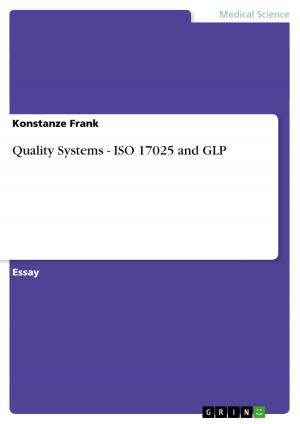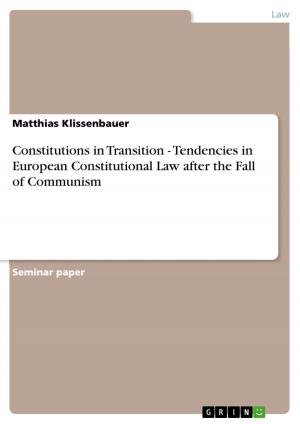Has the role of rituals in medieval politics been exaggerated?
Nonfiction, History, European General| Author: | Nicholas Williams | ISBN: | 9783640339631 |
| Publisher: | GRIN Publishing | Publication: | June 5, 2009 |
| Imprint: | GRIN Publishing | Language: | English |
| Author: | Nicholas Williams |
| ISBN: | 9783640339631 |
| Publisher: | GRIN Publishing |
| Publication: | June 5, 2009 |
| Imprint: | GRIN Publishing |
| Language: | English |
Seminar paper from the year 2006 in the subject History Europe - Other Countries - Middle Ages, Early Modern Age, grade: 1,5, University of Wales, Aberystwyth (History Department), course: Politics and Political Culture in Norman and Angevin England, language: English, abstract: The problems arising from both the term 'politics' and the term 'ritual' is that they are essentially modern concepts, at least in the sense in which we use them today. Consequently, anything said about the involvement and use of ritual in the realm of politics, a word here used in a broad sense of meaning, should be read with extreme caution. Politics, on a provisional definition for the purpose of this essay, is therefore to be understood as the means and mechanism through which decisions concerning the community are taken, exercised, and communicated. A ritual, on the other hand, is harder to define, and all attempts to do so would not pass unchallenged. For the purpose of this essay it will be understood as an often recurring proceeding, with symbolic meaning attached to its outer appearance. Borrowing from linguistics, but without engaging in that discipline's debate between structuralists and followers of Noam Chomsky's generative grammar, the notion of Ferdinand de Saussure's sign theory may help: a ritual itself will in this essay be understood as a sign, the realization of which is a signifier (signifiant), and the meaning of which is the signified (signifié). In other words, ritual here is understood as following similar patterns as language. Letters are of no use to an illiterate, as the shapes of letters mean nothing to him, nor does a ritual for someone unfamiliar with any given society's customs and values. The meaning (signified) has a dialectic connection with its realized counterpart, the performance of ritual (or, in Saussure's field, speech). The ritual itself is thus an abstract concept standing above both as the sign, which is, in turn, hollow if unperformed and to the historian only of use once put into practice and filled with meaning. To round the picture off though, it should be stated here that the analogy is a model and that there are strict limits to it, as will be explained in the conclusion. The word will be used as signifying a concept; a concept which is being contested, and which therefore stands in italics. After this interdisciplinary introduction with the help of linguistics, this essay will try and outline the use of ritual in politics through various sources and secondary materials, sketching rather than answering the question of whether the concept of ritual has been exaggerated in its appliance to medieval politics.
Seminar paper from the year 2006 in the subject History Europe - Other Countries - Middle Ages, Early Modern Age, grade: 1,5, University of Wales, Aberystwyth (History Department), course: Politics and Political Culture in Norman and Angevin England, language: English, abstract: The problems arising from both the term 'politics' and the term 'ritual' is that they are essentially modern concepts, at least in the sense in which we use them today. Consequently, anything said about the involvement and use of ritual in the realm of politics, a word here used in a broad sense of meaning, should be read with extreme caution. Politics, on a provisional definition for the purpose of this essay, is therefore to be understood as the means and mechanism through which decisions concerning the community are taken, exercised, and communicated. A ritual, on the other hand, is harder to define, and all attempts to do so would not pass unchallenged. For the purpose of this essay it will be understood as an often recurring proceeding, with symbolic meaning attached to its outer appearance. Borrowing from linguistics, but without engaging in that discipline's debate between structuralists and followers of Noam Chomsky's generative grammar, the notion of Ferdinand de Saussure's sign theory may help: a ritual itself will in this essay be understood as a sign, the realization of which is a signifier (signifiant), and the meaning of which is the signified (signifié). In other words, ritual here is understood as following similar patterns as language. Letters are of no use to an illiterate, as the shapes of letters mean nothing to him, nor does a ritual for someone unfamiliar with any given society's customs and values. The meaning (signified) has a dialectic connection with its realized counterpart, the performance of ritual (or, in Saussure's field, speech). The ritual itself is thus an abstract concept standing above both as the sign, which is, in turn, hollow if unperformed and to the historian only of use once put into practice and filled with meaning. To round the picture off though, it should be stated here that the analogy is a model and that there are strict limits to it, as will be explained in the conclusion. The word will be used as signifying a concept; a concept which is being contested, and which therefore stands in italics. After this interdisciplinary introduction with the help of linguistics, this essay will try and outline the use of ritual in politics through various sources and secondary materials, sketching rather than answering the question of whether the concept of ritual has been exaggerated in its appliance to medieval politics.















